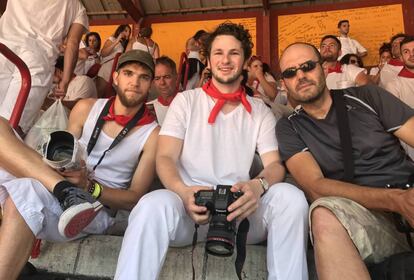The United States vs Spain: a graduate’s dilemma
EL PAÍS English Edition summer intern Henry Hahn reflects on his time abroad and the differences between interning in Spain and the US
As I wrap up my final week of an incredible internship at EL PAÍS (and a life-changing summer abroad), preparing to return to the United States for my final year of college, I can’t help but fixate on one of my favorite films of all time: Mike Nichol’s 1967 classic The Graduate. More specifically, I’m compelled to think of its opening title sequence, in which Dustin Hoffman, returning home from college, drifts along a moving walkway against a bland white wall at LAX airport, set to Simon and Garfunkel’s “The Sound of Silence.” The opening scene is a portending metaphor for how adolescent life in America can be viewed as a forced pathway – a straight line, on which you are almost vacuously propelled forward from the time you are born, with little purpose and little choice for direction – only to be thrown out into the wild upon graduating from college.

Though the film was made 50 years ago, the statement feels more pertinent than ever. Through the succeeding decades, it seems that the capitalist obsession on fixed paths in America has only intensified – that the infamous walkway of adolescence has only been elongated and accelerated.
Today, American students seeking admission to prestigious universities are advised to spend their high school summers engaged in an assortment of jobs, internships, and academic programs. The expectation continues through college summers, as students strive to secure coveted internships to bolster their resumes in time for graduation. The ideal maneuver is to land a gig at a large corporation the summer before your senior year – say, at a bank, a consulting firm, or a tech company – in the hopes of being given a return offer on your last day, saving you from the job search frenzy of senior year. Hence, the smoothest of transitions that allows the moving walkway to carry on, unimpeded.
After years of adhering to the process myself, I eventually burnt out. Just as I was approaching my final college summer – the most pivotal one of a young job seeker’s life, I rebelled and sought an unpaid internship in Spain – a land stereotyped in my mind by fiesta and siesta.

But during the months I’ve spent here, I’ve also gotten to see a more nuanced picture. Through the friends I’ve made, I’ve been given a privileged perspective on the difficulties surrounding the culture of work for young Spaniards. While, by contrast, there’s little to no pressure here for students to work internships during their college summers, whether or not they choose to do so ultimately has little impact on the reality they face upon graduating: in some sectors, it’s nearly impossible to find jobs straight out of college.
Two of my initial roommates when I arrived in June were biology students who had just graduated from the Autonomous University of Madrid, which boasts the best program in the field. One had just received her undergraduate degree, the other, his master’s. Both were working in coffee shops. Lacking nearly perfect grades, they were left jobless and contemplating grad school (yet, understandably, struggling to find the funds to pay for it). They resentfully attributed the absence of available jobs to a lack of investment in the sciences by the ruling PP party.
When I arrived in June, two of my roommates had just graduated with degrees in biology. They were both working in coffee shops
Others I met, who did manage to secure work (usually in more business-oriented sectors), seemed only slightly less unfortunate – plagued with low wages and long working hours. As I learned from them, many companies try to pigeonhole young prospects into internships or part-time roles for as long as possible to save on costs (typical intern salaries in Spain range from €600 to €900 per month). Given the higher-than-average unemployment in Spain as a result of the 2007 economic downturn, the market of young professionals is easily exploited.
One friend told me that it’s almost impossible to secure a full-time job with less than two years experience as an intern first. If you try to switch companies in the middle of this process, you’re often forced to start from square one. As a result, he ended up staying on an extra year as an intern at a company he didn’t enjoy working at to avoid demotion. He also took issue with the quality of work offered to young employees here. While applying for internships at many large American tech companies, he noticed that their Spanish branches often merely wanted interns to do dirty work – number crunching and basic data analysis – a notable contrast from the more educational and holistic internship programs offered in the US and elsewhere.
Another friend, working a low-salary job in Spain from Sweden, noted the difference in the daily schedule of a Spanish office. While Spaniards are accustomed to working long hours – often 12 hour days from 9am to 9pm – they are typically less productive, taking long lunch and coffee breaks. Though he didn’t necessarily enjoy this alternative system, he said the group mentality of his office made it difficult to do anything other than go along with it. If you wanted to be accepted socially by your co-workers, you were staying until 9pm.
Many Spanish companies pigeonhole graduates into internships, paying as little as €600 a month
Though he had hoped to transition to another job with a better salary, he was unsuccessful in his search and forced to return home. Even a bachelor’s degree and EU papers, fluency in three languages (English, Spanish, and Swedish) and previous work experience in the country were apparently not enough to expect a living wage in a high-skill job.
Nor can young Spaniards easily just pick up and move to another European country. I initially had just assumed that EU nations function exactly as states do in America, but it’s not a perfect analogy. Without the right connections or superior grades, it’s often difficult for a Spanish student to secure a well-paid, high-skill job in another country without prior work experience first. So moving abroad after school often just means waiting tables in a different country.
While some remain optimistic despite the difficulties they face, the recent biology graduate had a terse and despairing tone when I inquired about her possible options. “We’re screwed. We’re stuck here, and we’re screwed.”
Addressing my situation directly, she continued: “America may not be a perfect country, but you have no idea how much I wish I could have been raised there.”
Naturally, the comment struck me. There I was – sharing a tinto de verano with my friend at a quiet bodega late on a Wednesday night (something I would never do back home), enchanted by this country and its way of life, but also, in that very instant, humbled and reminded that I was only a tourist. Perhaps I had taken for granted all the opportunities I had been afforded back home.
If you want to be accepted socially by your co-workers, that can mean staying at work until 9pm
Still, I remain perplexed and defiant. Can there really be no compromise between the rigorous grind in America, which I felt deprived me of my adolescence, and the system in Spain, which limits many adolescents in their ability to transition to adulthood? (Most Spaniards live at home with their parents until their late 20s, a considerable number of them not by choice.)
Regardless, I find myself in quite the predicament. I would love to return to Spain when I finish school. It’s been a remarkable experience, and I don’t think I’ve had enough. But I only want to come back on the pretense of having a comfortable job – an aim that seems unattainable as a Spaniard, let alone an American lacking EU papers.
Perhaps it’s time to step off the moving walkway for real, entering the real world without concern for how much money I’ll make and without an immediate answer to what I’m going to do with my life. We’ll have to see if the work-obsessed American in me is up to such a task. I still have a year to decide. Until then, I’ll just be drifting along – like Dustin Hoffman – bleakly contemplating the void that not only awaits me, but that awaits many of the friends I have made here as well. Despite whatever sobering realities it has forced me to confront, the time I’ve spent in Spain and the people I’ve met here are far too special to ever forget.
Tu suscripción se está usando en otro dispositivo
¿Quieres añadir otro usuario a tu suscripción?
Si continúas leyendo en este dispositivo, no se podrá leer en el otro.
FlechaTu suscripción se está usando en otro dispositivo y solo puedes acceder a EL PAÍS desde un dispositivo a la vez.
Si quieres compartir tu cuenta, cambia tu suscripción a la modalidad Premium, así podrás añadir otro usuario. Cada uno accederá con su propia cuenta de email, lo que os permitirá personalizar vuestra experiencia en EL PAÍS.
¿Tienes una suscripción de empresa? Accede aquí para contratar más cuentas.
En el caso de no saber quién está usando tu cuenta, te recomendamos cambiar tu contraseña aquí.
Si decides continuar compartiendo tu cuenta, este mensaje se mostrará en tu dispositivo y en el de la otra persona que está usando tu cuenta de forma indefinida, afectando a tu experiencia de lectura. Puedes consultar aquí los términos y condiciones de la suscripción digital.









































